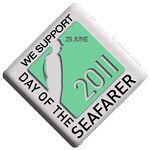
Saturday 25th of June was the IMO's Day of the Seafarer - a day to celebrate seafarers, the job they do and why the world would be a lesser place without them. I spent the Day of the Seafarer over, and not on, the Indian Ocean which is the reason for my late posting.
Although my days as a real seafarer are over, it forms the strongest affiliation between my person and professional self. To provide some structure to this posting, I'm going to ask readers who have been to sea and who influence the lives of seafarers to consider the following...
Seafarers live and work aboard ships in the same way you live at your home and work at your office. When you're reviewing the latest Outline Specification for a new ship, please look at the standard of the fitout, automation and equipment. And yourself whether you would live in an unlined steel cabin with a single 100V powerpoint for 10 months, or whether you could avoid a close quarters situation running accross the wheelhouse between the autopilot and ARPA. People who design ships don't sail on ships, and we have an obligation to apply our knowledge to make ships better places to live and work.
Seafarers need sleep. Seafarers cannot work for 38 hours straight because junior officers are not qualified or experienced enough to maintain a cargo watch. Give them people capable of efficiently performing their own job so that they can get the rest they need to do their job.
Seafarers need protection. Because your company decided to opt out of the tax system which pays for warships and airforces doesn't remove the risk of your seafarers becoming hostages. Give your Masters freedom to navigate around piracy zones and the resources to protect their ships and crews. Build them a citadel. Even better, given them an armed guard or three to fight back.
Seafarers need motivation and appreciation. Just because you didn't get the Statements of Facts as soon as the Pilot disemarked probably means the Captain is probably busy settling down the ship on passage. Share with the Captain and the Chief Engineer what's important on this charter, and what they need to know to make the voyage a financial success.
Seafarers are rarely criminals. They become criminals through being improperly incentivised to perform criminal acts such as make a 'majic pipe' or as a consequence of commercial pressures to act unsafely. No Captain set out to collide with a bridge pier or run aground on a coral reef. However, they are all too often arrested for the consequences of the actions and contributions of others aboard and ashore.
Seafarers in the main hard working, inventive, practical and good natured. They navigate daily around the hidden shoals in charter parties, Port State Control inspections and Superintendent's demands. Once a year we celebrate them - every day we need them.
The Antipodean Mariner
26th June 2011






